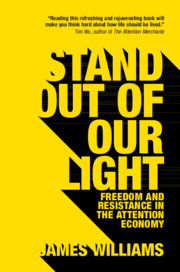The reaction to Elon Musk's vision of a more open Twitter reveals the decline of free expression as a cultural value.
The Birth, and Digital Death, of the Electric Dream
What is wrong with technology today? Why does it seem to have turned against us? These are the questions at the heart of a new book by James Williams, a Google strategist who fled to Oxford for a doctorate in philosophy. Williams’ answers are persuasive on the point fewer and fewer of us need persuasion about: Something is rotten in our relationship with our “wondrous little machines,” and it’s important to find out what.
But there the satisfaction ends. The earnest elegance of Stand Out of Our Light: Freedom and Resistance in the Attention Economy, a slim manifesto against technological threats to our freedom of will, can’t quite mask what is at first blush a strange imprecision about exactly what is the enemy.
Unfortunately for Williams, and others in the the growing cadre of techies-turned-critics-of-technology, the reality he skirts is that his corrective view is grounded in the same electric-age culture as the economic relationship he hopes to depose. Both Williams’ utopia and the dystopia he attacks are fueled by fantasies and illusions that the digital world is busily obsolescing.
Williams’ view of things has the comfort of familiarity. Technology has unleashed an infinitude of information, presenting our finite selves with more bids for attention than we can possibly grant. But grant, we do. On line, says Williams, impulse is fed and rewarded much more frequently and intensely than intention is. That’s the nature of the “attention economy”: We get the bang of appetitive habit, and they take our buck and throw away the key. Overwhelmed, our attention has become scarce, a prized commodity the biggest tech players compete in cutthroat fashion to seize.
As if that weren’t bad enough, Williams goes on, the psychological and cultural crisis fostered by this new economic relation spells disaster. Our very will, the wellspring of our freedom, is at stake. “I used to think there were no great political struggles left,” he sighs. “The truly epic defenses of freedom”—note well this formulation—“had already been fought and won by generations greater than my own, leaving to my time only the task of dutifully administering our hard-earned political inheritance.” But lo! “How wrong I was. The liberation of human attention may be the defining moral and political struggle of our time. Its success is prerequisite for the success of virtually all our other struggles.”
How easy it is to ride along with Williams, swept up by the force of his familiar rhetoric—a rhetoric of meaning that has been hardwired into many of us for decades through music, television, and popular culture. And how convenient it is that the technological foe Williams identifies is exactly the sort we would need today in order to play a relevant part in reenacting that rhetoric in contemporary life. What a coincidence that the disillusioned epigone of an age of heroic moral performance should discover that today’s ills can only be solved by recovering a starring role in just such a play!
For there’s no question that digital technology is itself disenchanting, even as it pitilessly obsolesces, the whole conceptual framework of hero-stardom and romantic resistance that Williams wants so badly to reclaim. One look at social credit (the digital ranking of individuals by sorting through a database, not to be confused with social media, which involves a user’s app-based or website-based communication with fellow users) tells the story. Social credit, like digital generally, shapes a psychological and social environment defined by the particulars of an individual user’s memory, biography, and identity. That’s a diametric contrast to the environment formed by televisual media, which is all about imagination, make-believe, and fantasy. Think of the difference between China’s new database-driven, points-based surveillance regime and America’s round-the-clock dumpster fire of scorching-hot takes on Twitter.
The pre-digital world of electricity is ably captured in the credo, “If you can dream it, you can do it!”—coined so brilliantly by a Disney employee that it is often attributed to Walt himself. This electric ladyland, to use Jimi Hendrix’s language, is one where mysticism and occultism, the hero’s journey and consciousness-expansion, the derangement of the senses and the mounting of the barricades, all merge together into a single cosmic dream. The guitarist wanted the album cover of Electric Ladyland to show his band and a group of children seated on the Alice in Wonderland sculpture in New York’s Central Park. It’s the world of Strawberry Fields and Star Wars, Bono and Bowie, one world—and then one Internet. “It’s not just a place, it’s a state of mind,” as electric people say, where technology that brings people closer together will axiomatically bring us all closer to harmony, unity, transcendence, and perfection.
Given this worldview, it’s easy to see how those shaped by the televisual imagination like Williams would have been so staggeringly naïve and optimistic at the time of social media’s advent. After all, social media—in stark contrast with social credit—is about the same things as television is about, just more of ’em. Social media is simply television perfected, which means television democratized. Its version of the priesthood of all believers is everyone becoming his or her own channel, or even his or her own broadcast station. From the pre-digital standpoint, social media promised to at last bring down to earth the magic kingdom of universal and harmonious self-creation that enlightened Westerners had made themselves believe in for ages.
We can now see how weak and hollow that romantic vision really was. Digital teaches us daily that the supposed plenty of televisual life is what Kennedy-era FCC Chair Newt Minow—later appointed Honorary Consul General of trailblazing surveillance state Singapore—said it was: a “vast wasteland.” The vast majority of social media content is hostile or boring. The vast majority of creative works are mediocre or inessential. Even the best of the best often merely recycles worn-out legends or old trends. Even today’s huge hits are forgotten tomorrow. (Our excessive prestige television offerings, crowded lifeboats packed with refugee creatives, struggle to fight the reality that only a handful of shows can attract broad audiences.) Those who get publicity are either wasting their money or failing at life. And the frenetic competition to sit at the top of the stack for your 15 minutes of fame (or less) is ultimately, digital teaches, a swindle.
Many people today feel these things acutely, yet are saddened and confused by the apparent annihilation of meaning and purpose that comes with them. Williams, desperate to keep the electric dream alive, is transparently one of them. Because he cannot imagine a future where the Disney credo no longer animates our will, he refuses to perceive how digital technology is doing away with the mindscape of the electric age. “At its best, technology opens our doors of perception, inspires awe and wonder in us, and creates sympathy between us,” insists Williams in the climactic scene of the movie playing in his head. “It means using our transgressions to advance the good. This is not utopianism. This is imagination.” And it is over, digital tells us.
It is frustrating to watch Williams recognize so many signposts toward the future only to reject the messages they bear. All too rightly, his book acknowledges that our tools are not “neutral” (which appears to be Google CEO Sundar Pichai’s favorite word), but rather shape us even as we shape them. Wisely, he cites philosopher Matthew Crawford’s warning that electric-age culture, modern and secular, stripped individuals of the context they needed to stay sane and integrate themselves within. And he references Marshall McLuhan’s description of “the ultimate electric goal” as “collective consciousness,” even as he warns that just because there are some techies who “conceive of it in Eastern religious terms” doesn’t mean tech will deliver on that promise.
While invoking McLuhan, the author neglects to attend to the Canadian theorist’s focus on Aristotelian formal cause, which reveals how the rise of digital technology as a medium of communication causes new psychological and sociological forms that no degree of “resistance” can knock away. Nor does he consider how Aristotle, as opposed to his romantic hero Jean-Jacques Rousseau, supplies firmer “philosophical foundations” for those grappling with the failures of “Western liberal democracy.”
Williams’ class of electric-age elites faces a two-headed problem—and even with both heads growling in their face, they are loath to admit the nature of the beast.
First, social media has revealed that what was supposed to perfect their world has in fact disclosed its hollowness and horrors.
Second, they failed to see this coming because they failed at what they were supposed to do best: understand the future by imagining it best. Digital technology is fundamentally unlike the pre-digital televisual technology that preceded it. Digital makes us perceive our lives, our world, and ourselves differently from the way televisual makes us perceive them. Digital disenchants the dreams that televisual wove around our world and inside our hearts and minds. All this they missed.
Williams has missed, too, that digital has social media and its “attention economy” on the chopping block. We are already seeing trends ranging from user disgust toward Twitter and the no-platforming of porn by businesses and governments. In the main, instead of the world needing hero-stars like Williams to lead them in deleting their accounts, the world is witnessing large swaths of mere users “staying away,” as Sam Goldwyn quipped, “in droves.” If social media is to lose its commanding relevance like the rest of the televisual world is doing, it will be through neglect, not romantic revolution.
“There will be no scales dropping from eyes, no Toto pulling back the curtain to reveal the would-be wizards pulling the levers,” Williams insists. “There will be no sudden realization of the gravity and unsustainability of this situation.” This is just what someone who insists upon remaining a leader, even after his machines have betrayed him, would say. In fact the realization that we are not in Kansas anymore is happening every day. It happened with the election of Donald Trump; it happened with the Brexit vote; it happened with the rise of the Visegrad Group; it happened with the near-instantaneous realignment of expert consensus against China; it is happening still with the gilets jaunes movement.
And it will keep on happening, no matter how stridently members of the electric-age leadership class insists that we need them, that we cannot be the good guys without them.
Digital speaks differently. If the free human will is to recover from its televisual trance, it will happen in the manner of this ever-more-rude awakening from our protracted electric dreams—not in the manner of history repeating itself as farce.



